The history of the United States is intertwined with a rich collection of documents that have played pivotal roles in shaping the nation’s identity, governance, and rights. From its founding principles to significant moments of social change, these documents serve as the bedrock of American democracy and hold immense historical and cultural significance. They encapsulate the ideals and aspirations of the American people, guarantee fundamental rights, and outline the structures of government. From the Declaration of Independence, which declared the colonies’ independence from Britain, to the United States Constitution, which established the framework for the nation’s government, and the Emancipation Proclamation, which abolished slavery, these documents stand as enduring testaments to the nation’s journey towards liberty, equality, and justice. This article delves into the most important documents in US history, exploring their context, impact, and lasting legacy on the American experience.

Declaration of Independence (1776)
The Declaration of Independence, written in 1776, stands as one of the most significant documents in American history. Drafted by Thomas Jefferson and adopted by the Second Continental Congress, it declared the thirteen American colonies’ independence from British rule, igniting the flames of revolution. The document boldly asserted the fundamental rights of life, liberty, and the pursuit of happiness, while condemning the tyranny of King George III. Its powerful words, including the famous opening phrase “We hold these truths to be self-evident,” encapsulated the ideals of individual freedom, equality, and the right to self-governance. The Declaration of Independence not only marked the birth of a new nation but also inspired movements for independence and democracy around the world. It remains a timeless symbol of the American spirit and the unyielding pursuit of liberty.
See also: 11 Most Important Battles in US History

United States Constitution (1787)
The United States Constitution, ratified in 1787, stands as the supreme law of the land and is a cornerstone of American democracy. Crafted by the Founding Fathers, this remarkable document established the framework for the nation’s government and enshrined the principles of individual rights, separation of powers, and federalism. It outlines the three branches of government—executive, legislative, and judicial—and delineates their powers and responsibilities. The Constitution also includes the Bill of Rights, a series of amendments that protect essential freedoms such as freedom of speech, religion, and due process. Through its enduring nature and adaptability, the Constitution has guided the nation through profound social and political changes while remaining a symbol of stability and the rule of law. It represents the collective vision of a nation and remains a living document that continues to shape and define the United States.
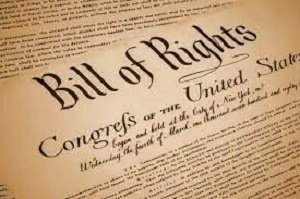
Bill of Rights (1791)
The Bill of Rights, adopted in 1791, holds a central place in American history and serves as a vital safeguard of individual liberties. Comprising the first ten amendments to the United States Constitution, the Bill of Rights guarantees essential freedoms and protections that are integral to the American democratic experience. It enshrines cherished rights such as freedom of speech, religion, and the press, the right to bear arms, and protection against unreasonable searches and seizures. Additionally, it guarantees due process of law, the right to a fair trial, and protection against cruel and unusual punishment. The Bill of Rights emerged from the belief that a government’s power must be limited and that individual rights must be safeguarded against encroachment. Its enduring relevance and impact continue to ensure the preservation of individual liberties and serve as a cornerstone of American democracy.
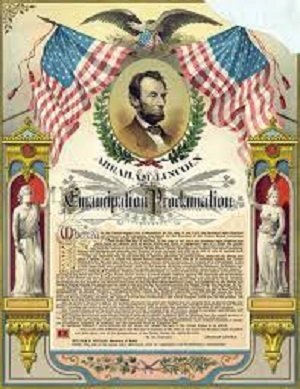
Emancipation Proclamation (1863)
The Emancipation Proclamation, issued in 1863 by President Abraham Lincoln, stands as a watershed moment in American history. This historic document declared that all slaves in Confederate-held territory were to be set free, effectively shifting the purpose of the Civil War to include the abolition of slavery. While it did not immediately grant freedom to all enslaved people, the Emancipation Proclamation marked a significant step towards the eventual end of slavery in the United States. It served as a moral and political turning point, inspiring hope and bolstering the Union’s cause. The proclamation also laid the groundwork for the passage of the 13th Amendment to the Constitution, which officially abolished slavery throughout the nation. The Emancipation Proclamation’s enduring legacy continues to symbolize the struggle for equality and remains a testament to the power of executive action in shaping the course of history.
You may also like: 14 Famous Death Penalties of US History
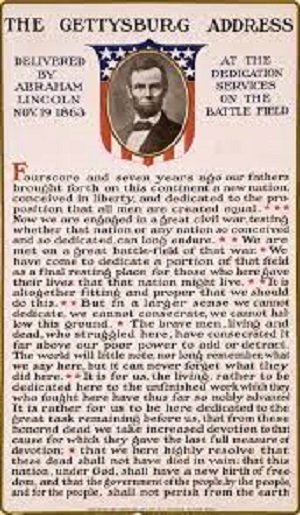
Gettysburg Address (1863)
The Gettysburg Address, delivered by President Abraham Lincoln in 1863, stands as one of the most renowned speeches in American history. Given the dedication of the Soldiers’ National Cemetery in Gettysburg, Pennsylvania, during the height of the Civil War, Lincoln’s address encapsulated the nation’s ideals and the significance of the ongoing struggle. In just a few profound and concise sentences, Lincoln reflected on the sacrifice of those who fought in the Battle of Gettysburg and redefined the purpose of the war as a quest for equality and the preservation of democracy. His words, emphasizing the principles of liberty, equality, and the enduring power of government “of the people, by the people, for the people,” continue to resonate and inspire generations. The Gettysburg Address serves as a timeless reminder of the importance of unity and the ongoing pursuit of justice in the United States.

13th Amendment (1865)
The 13th Amendment to the United States Constitution ratified in 1865, stands as a monumental milestone in the nation’s history. This transformative amendment abolished slavery and involuntary servitude, except as punishment for a crime, thereby bringing an end to one of the gravest injustices in American society. The 13th Amendment marked the culmination of years of struggle, sacrifice, and moral reckoning during the Civil War era. It ensured that the principles of freedom and equality, enshrined in the Constitution, were extended to all individuals, regardless of race or ethnicity. By permanently eradicating the institution of slavery, the 13th Amendment set the stage for the long and ongoing battle for civil rights and paved the way for a more inclusive and just society. Its profound impact continues to shape the trajectory of the United States toward a more equitable future.
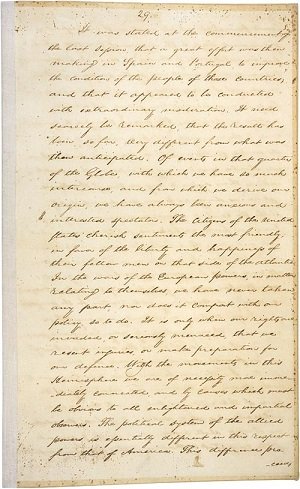
Monroe Doctrine (1823)
The Monroe Doctrine, proclaimed in 1823 by President James Monroe, is a foundational principle of American foreign policy. The doctrine articulated the United States’ stance on European colonization in the Americas and asserted that any further colonization or intervention in the Western Hemisphere would be viewed as a threat to U.S. national security. It also declared that the United States would not interfere in European affairs. The Monroe Doctrine not only signaled American independence and its emergence as a regional power, but it also established the United States as the dominant force in the Western Hemisphere. While initially met with skepticism and limited enforcement, the doctrine would later serve as a guiding principle for U.S. foreign policy, shaping the nation’s relationship with its neighbors and influencing geopolitical dynamics in the Americas.
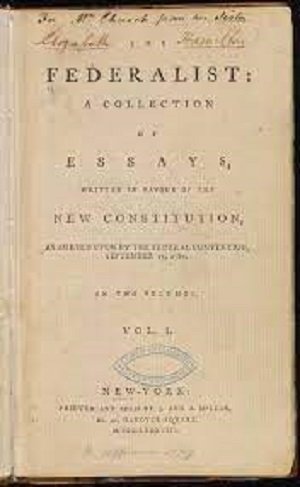
Federalist Papers (1787-1788)
The Federalist Papers, written between 1787 and 1788 by Alexander Hamilton, James Madison, and John Jay, played a crucial role in shaping the American political landscape and the ratification of the United States Constitution. Comprising 85 essays, the Federalist Papers were a persuasive and intellectual defense of the proposed Constitution, advocating for a strong federal government and the need for a balance of power among the branches. These influential essays addressed the concerns of the Anti-Federalists, who opposed the Constitution and sought to garner support for its adoption. The Federalist Papers provided a deep analysis of republican government, the separation of powers, and the protection of individual rights. Their impact on American political thought and the interpretation of the Constitution cannot be overstated, making them an essential and enduring contribution to the nation’s political discourse.

Civil Rights Act (1964)
The Civil Rights Act of 1964 stands as a landmark piece of legislation in the United States, marking a significant turning point in the nation’s history. Enacted during the height of the Civil Rights Movement, this transformative law aimed to dismantle racial segregation and discrimination in various spheres of society. It prohibited discrimination based on race, color, religion, sex, or national origin in public accommodations, employment, and federally funded programs. The Civil Rights Act of 1964 was a response to the persistent systemic injustices faced by African Americans and other marginalized communities. Its passage not only paved the way for desegregation and equal treatment under the law but also served as a catalyst for subsequent civil rights legislation. The Act represents a pivotal moment in the ongoing struggle for equality and justice in the United States.
You may also like: 12 Most Influential Presidents in American History
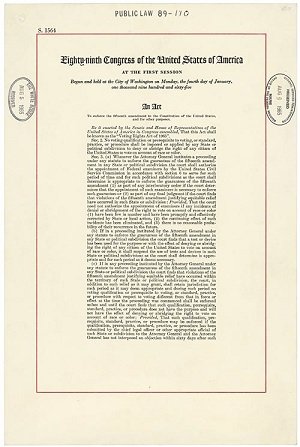
Voting Rights Act (1965)
The Voting Rights Act of 1965 stands as a crucial milestone in the fight for equal voting rights and the advancement of democracy in the United States. Signed into law during the height of the Civil Rights Movement, the Act aimed to combat racial discrimination in voting and eliminate barriers that prevented African Americans from exercising their right to vote. It outlawed discriminatory voting practices, such as literacy tests and poll taxes, and provided federal oversight in jurisdictions with a history of voter suppression. The Voting Rights Act of 1965 had an immediate and profound impact, significantly increasing African-American voter registration and political representation. It remains a key piece of legislation that continues to protect and enforce voting rights, ensuring that all citizens have an equal opportunity to participate in the democratic process and have their voices heard.
Conclusion
The most important documents in US history stand as enduring symbols of freedom, equality, and justice. From the Declaration of Independence to the United States Constitution, the Bill of Rights, and the Voting Rights Act, these documents embody the nation’s core values and provide the framework for American democracy. They have shaped the course of history, protected individual rights, and paved the way for progress. As we reflect on the significance of these documents, we recognize their profound impact on the American experience and their ongoing relevance in the pursuit of a more inclusive and equitable society.
